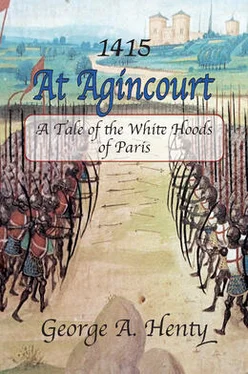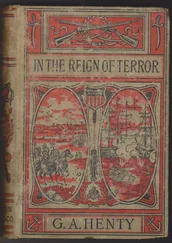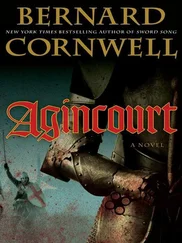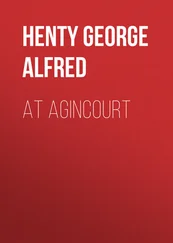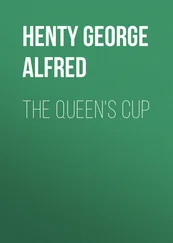Then he went on to recount how Guy had warned himself and his friends of the danger that threatened, and how difficult it had been to persuade them that only by flight could their safety be secured; and how at last he and the two knights with him had returned to Paris to escort Dame Margaret.
“Truly, Count, your narrative is a stirring one,” Sir Eustace said; “but I know not as yet how Guy managed to gain the information that the house was going to be attacked and so sent to you for aid, or how he afterwards learned that your names were included with those of the Duke of Bar and others whom the butchers compelled the Duke of Aquitaine to hand over to them.”
“Dame Margaret or your esquire himself can best tell you that,” the count said. “It is a strange story indeed.”
“And a long one,” Dame Margaret added. “Were I to tell it fully it would last till midnight, but I will tell you how matters befell, and to-morrow will inform you of the details more at length.”
She then related briefly the incidents that had occurred from the day of her interview with the Duke of Burgundy to that of her escape, telling of the various disguises that had been used, the manner in which Guy had overheard the councils of the butchers before they surrounded the hotel of the Duke of Aquitaine and dragged away a large number of knights and ladies to prison, and how the four men-at-arms had re-entered Paris after their escape, and remained there in readiness to aid her if required.
Guy himself was not present at the narration, as he had, after staying for a short time in the room, gone down into the banqueting-hall to see that the men's wants were well attended to, and to talk with the English men- at-arms and archers.
“It seems to me,” Sir Eustace said when his wife had finished the story, “that my young esquire has comported himself with singular prudence as well as bravery.”
“He has been everything to me,” Dame Margaret said warmly; “he has been my adviser and my friend. I have learned to confide in him implicitly. It was he who secured for me in the first place the friendship of Count Charles, and then that of his friends. He was instrumental in securing for us the assistance of the Italian who warned and afterwards sheltered us—one of the adventures that I have not yet told, because I did not think that I could do so without saying more than that person would like known; but Guy rendered him a service that in his opinion far more than repaid him for his kindness to us. The messenger he employed was a near relation of his.”
And she then related how Guy had rescued this relation from the hands of the butchers, how he had himself been chased, and had killed one and wounded another of his assailants; and how at last he escaped from falling into their hands by leaping from the bridge into the Seine.
“You will understand,” she said, “that not only our host but we all should have been sacrificed had not the messenger been rescued. He would have been compelled by threats, and if these failed by tortures, to reveal who his employer was and where he lived, and in that case a search would have been made, we should have been discovered, and our lives as well as that of our host would have paid the penalty.”
“It is impossible to speak too highly of the young esquire,” Sir John Poupart said warmly. “For a short time we all saw a good deal of him at the fencing-school, to which D'Estournel introduced him. He made great progress, and wonderfully improved his swordsmanship even during the short time he was there, and the best of us found a match in him. He was quiet and modest, and even apart from the service he had rendered to D'Estournel, we all came to like him greatly. He is a fine character, and I trust that ere long he may have an opportunity of winning his spurs, for the courage he has shown in the defence of his charges would assuredly have gained them for him had it been displayed in battle.”
The knights were persuaded to stay a few days at the castle, and then rode away with their retainers with mutual expressions of hope that they would meet again in quieter times. Guy had opened the little packet that Katarina had given him at starting. It contained a ring with a diamond of great beauty and value, with the words “With grateful regards.”
He showed it to Sir Eustace, who said:
“It is worth a knight's ransom, lad, and more, I should say. Take it not with you to the wars, but leave it at home under safe guardianship, for should it ever be your bad luck to be made a prisoner, I will warrant it would sell for a sufficient sum to pay your ransom. That is a noble suit of armour that the silversmith gave you. Altogether, Guy, you have no reason to regret that you accompanied your lady to Paris. You have gained a familiarity with danger which will assuredly stand you in good stead some day, you have learned some tricks of fence, you have gained the friendship of half a score of nobles and knights; you have earned the lasting gratitude of my dame and myself, you have come back with a suit of armour such as a noble might wear in a tournament, and a ring worth I know not how much money. It is a fair opening of your life, Guy, and your good father will rejoice when I tell him how well you have borne yourself. It may be that it will not be long before you may have opportunities of showing your mettle in a wider field. The English have already made several descents on the coast, and have carried off much spoil and many prisoners, and it may not be long before we hear that Henry is gathering a powerful army and is crossing the seas to maintain his rights, and recover the lands that have during past years been wrested from the crown.
“I propose shortly to return to England. My dame has borne up bravely under her troubles, but both she and Agnes need rest and quiet. It is time, too, that Charlie applied himself to his studies for a time and learnt to read and write well, for methinks that every knight should at least know this much. I shall take John Harpen back with me. Such of the men-at-arms and archers as may wish to return home must wait here until I send you others to take their places, for I propose to leave you here during my absence, as my castellan. It is a post of honour, Guy, but I feel that the castle will be in good hands; and there is, moreover, an advantage in thus leaving you, as, should any message be sent by Burgundian or Orleanist, you will be able to reply that, having been placed here by me to hold the castle in my absence, you can surrender it to no one, and can admit no one to garrison it, until you have sent to me and received my orders on the subject. Thus considerable delay may be obtained.
“Should I receive such a message from you, I shall pass across at once to Calais with such force as I can gather. I trust that no such summons will arrive, for it is clear that the truce now made between the two French factions will be a very short one, and that ere long the trouble will recommence, and, as I think, this time Burgundy will be worsted. The Orleanists are now masters of Paris and of the king's person, while assuredly they have the support of the Duke of Aquitaine, who must long to revenge the indignities that were put upon him by Burgundy and the mob of Paris. They should therefore be much the stronger party, and can, moreover, issue what proclamations they choose in the king's name, as Burgundy has hitherto been doing in his own interest. The duke will therefore be too busy to think of meddling with us. Upon the other hand, if the Orleanists gain the mastery they are the less likely to interfere with us, as I hear that negotiations have just been set on foot again for the marriage of King Henry with Katherine of France. The English raids will therefore be stopped, and the French will be loath to risk the breaking off of the negotiations which might be caused by an assault without reason upon the castle of one who is an English as well as a French vassal, and who might, therefore, obtain aid from the garrison of Calais, by which both nations might be again embroiled.”
Читать дальше
